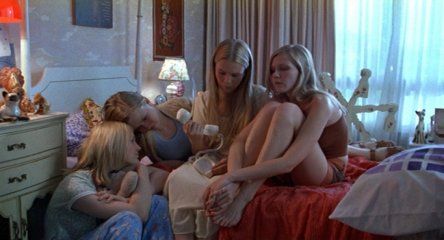Even then, as teenagers, we tried to put the pieces together. We still can't.

As a writer/director, Sofia Coppola has had a lot to live up to, and by that I don't mean the work of her father, Francis. I'm talking about her debut feature, 1999's The Virgin Suicides, which is about as assured as you can get. Based on the novel by Jeffrey Eugenides, it tells of the hold the five Lisbon sisters, who ranged in age from 13 to 17, had on the imaginations of the boys in their upscale Michigan suburb -- and still do decades after they mysteriously took their lives.
Since the story is told from the boys' point of view, there are no definitive answers forthcoming about why the girls do what they do, but their actions assuredly have something to do with their extremely sheltered upbringing courtesy of their strict, religious mother (Kathleen Turner) and milquetoast father (James Woods). The first to try it is actually the youngest, Cecilia (Hanna Hall), whose subsequent session with a psychiatrist (Danny DeVito) yields the shocking suggestion that the girls should be allowed to see boys outside of school, which translates to one being invited over for dinner, during which he takes full advantage of being allowed into their inner sanctum, and the girls throwing their first and only party, during which Hall makes her second, more successful attempt.
Now down to four, the focus again is on the youngest, Lux (Kirsten Dunst), who is avidly pursued by charming sweet-talker Josh Hartnett (who's played in present-day interviews by a wistful Michael Paré). In order to get permission to take Dunst to the Homecoming Dance, Hartnett also has to supply dates for her older sisters (Chelse Swain, A.J. Cook and Leslie Hayman), which isn't a problem. What is a problem is the dance turns out to be the last gasp of freedom for all of them when Dunst stays out after curfew and Turner responds by pulling the girls out of school. She stops short of having Woods put bars on all the windows, but the perception that they're prisoners in their own home is unavoidable.
To evoke the mid-'70s setting, Coppola leans heavily on the period-appropriate rock and pop songs. This pays off handsomely in the scene where a group of boys call up the captive girls and they communicate by playing records back and forth over the phone. I also appreciated the subtle touch of each music cue sounding like it was sourced from an actual vinyl record, with the pops and crackle intact. Another detail that I found refreshing was the way Hartnett has two dads (and not in a Paul Reiser sitcom kind of way) and nobody makes a big deal about that. (Well, maybe Turner would have if she knew about them, but I'll take my positive portrayals of gay couples where I can get them.)